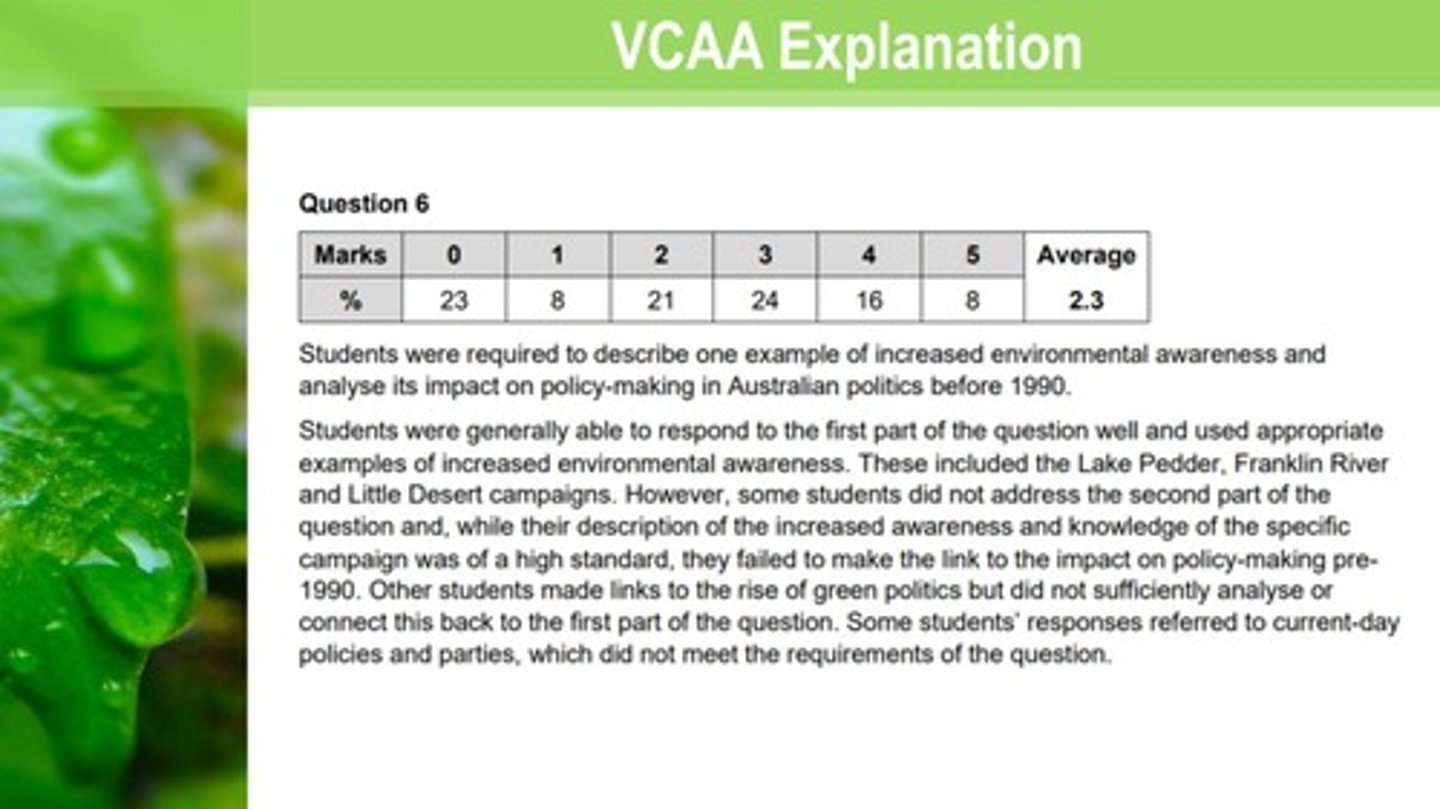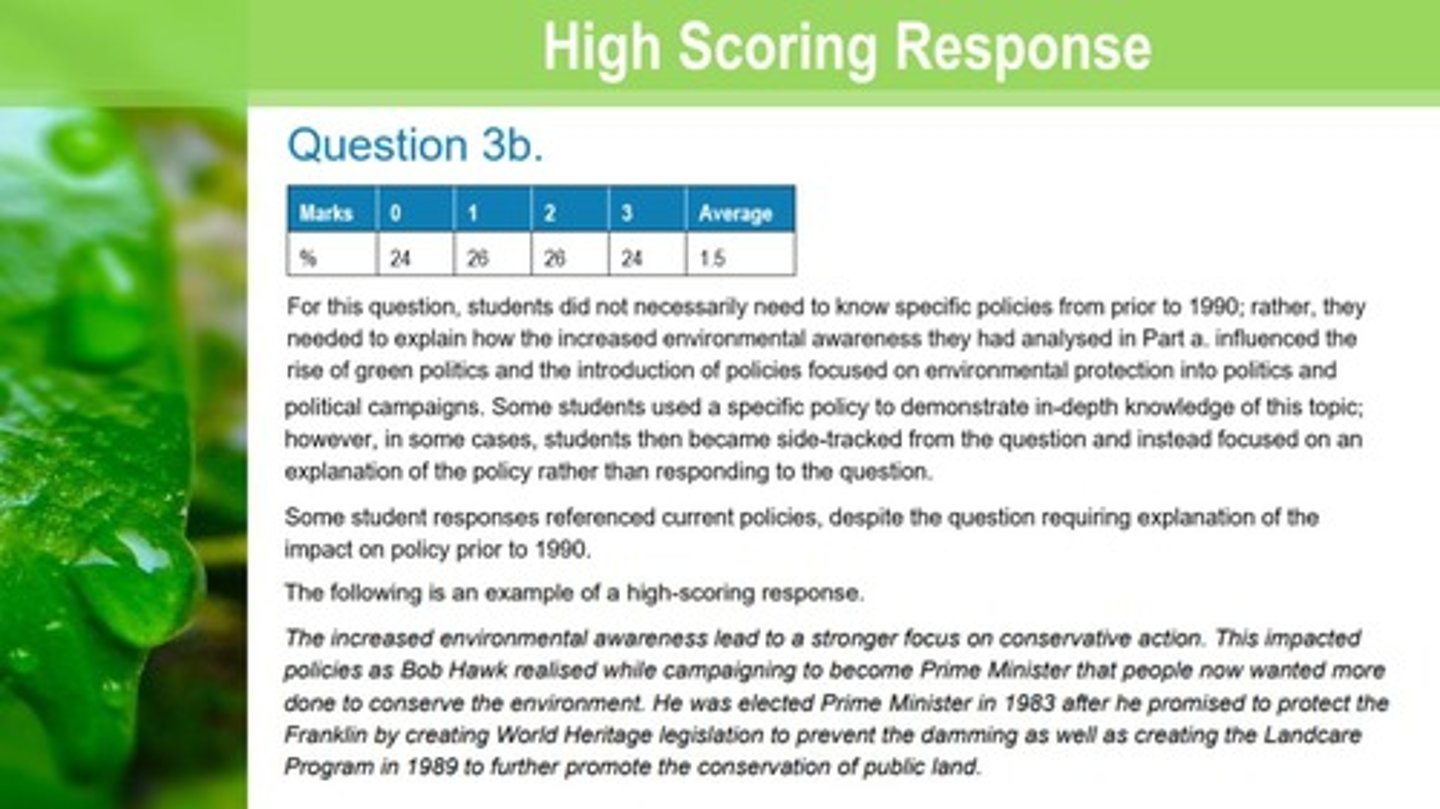3.1.4 - Environmental movements
1/43
There's no tags or description
Looks like no tags are added yet.
Name | Mastery | Learn | Test | Matching | Spaced |
|---|
No study sessions yet.
44 Terms
Environmental movements were born in Australia in the
1860's
Tensions boiled over from the __________ __________ through the ______ _______ in a number of important environmental protests and campaigns that would dramatically impact the way Australians viewed natural places.
late 1960's, early 1980's
Lake Pedder
A small glacial lake surrounded by mountains in the
south-west of Tasmania. A prominent feature of the lake is the pale pink quarts sand beach that
emerged from the water to one end, as the water level dropped.
Why did protests regarding lake Pedder begin?
Protests began when in 1967 the Tasmanian Government revoked the status of the
Lake Pedder National Park that had protected the lake since 1955, and due to the need for electricity (hydro generated) a proposal was passed in 1967 to
create a dam at Lake Pedder.
When did protests regarding lake Pedder begin?
1967
Who were the dams designed and constructed by?
Tasmania's Hydro Electric Commission
Which lake Pedder environmental movement was formed in 1971
the Lake Pedder Action Committee
What did the Lake Pedder Action Committee do
Protested the damming
What happening in 1972 regarding Lake Pedder
Tasmania's Lake Pedder was flooded for a hydro-electricity scheme.
In 1972 after a meeting held by the Lake Pedder Action Committee the _____________________________ was formed
United Tasmania Group
The United Tasmania Group was one of the first
"green" political parties in the world
Were any UTG candiates elected
no
Even though none of their 12 candidates were successfully elected, they continued to
pressure members of the Tasmanian Parliament to act on conservation and environmental issues.
________________________ breifly joined the UTG in __________
Dr. Bob Brown, 1975
After the flooding of Lake Pedder, which committee was formed in 1974
South - West Action Committee
In 1976, the South West Action Committee evolved into the
Tasmanian Wilderness Society (TWS)
Which location in Tasmania was proposed to be dammed after Lake Pedder
The Franklin River
The damming of the Franklin river was a proposed part of the
Tasmanian Government's hydro schemes
What was The Wilderness Society's (T.W.S) opinion on the proposed damming of the Franklin River
They were opposed to the damming of the Franklin River because they wanted to preserve the environmental significance and biodiversity of the area.
The Tasmanian Wilderness Society were originally
formed in
1976
The TWS were initially known as the ________________ ___________ _____________ ______________ in opposition to the damming of Lake
Pedder.
South-West Action Committee
The TWS later changed their name to _____ _______________ ___________ when they became a _____________ organisation.
The Wilderness Society, National
Foundation of the TWS
Originally formed in 1976, initially known as the south-west action committee in opposition of the damming of Lake Pedder.
What was so special about the Franklin River?
A natural beauty, and one of Australias last truly wild rivers and had cultural remains present in a cave in the Franklin River environment.
How did the TWS protest the Damming of the Franklin River?
The TWS began a publicity campaign and in 1980 10,000 people walked down the streets of Hobart in protest, and in 1982
Dr. Bob Brown and the Tasmanian Wilderness Society led a three-month
blockade of the dam site that saw at least 2,300 people participate and more than 1,000 arrested. Many campaigners were imprisoned.
People on the mainland of Australia
started to hold rallies
Individuals took action by writing 'No Dams'
on their ballot papers in various state
and federal by-elections.
The leader of the TWS is
Dr. Bob Brown since 1976
In ______, archaeologists uncovered cultural artefacts at ______________ Cave in the Lower Franklin (dating back __________ years)
1981, Kutikina Cave, 20,000
The Tasmania Hydro Electric Scheme aimed at
increasing power for Tasmania's industrial section and also generating jobs in an area of the
state that was struggling economically
(approximately 25% unemployment)
The discovery at Kutikina Cave was one of the
integral factors in getting ____________________________________ and saving the river.
world heriatge status
When did the Franklin River receive world heritage status
1983
Despite the Franklin being part of a World Heritage Area, the Tasmanian Government
Pushed ahead with the construction of the dam
What were the conflicts regarding the damming of the franklin river.
Initially, the conflict over the damming of the Franklin river was between the Tasmanian Government and The Wilderness Society.
In 1983, the Tasmanian (state) government challenged the Federal government's orders in the High Court. (World Heritage Act 1983)
What did the Tasmanian State government do after the Franklin river was given world heritage status
The Tasmanian Government challenged the World Heritage Properties Conservation
Act 1983 and refused to halt construction of the dam.
The Tasmanian State Government argued that
It argued that the Commonwealth Government did not have power under the Commonwealth Constitution to stop the dam.
How did the Franklin River Damming protests influence Bob Hawke of the Labour party to win the election?
Bob Hawke recognised the growing electoral power of environmental movements and the people that joined them. As a result, the Australia Labour Party took an anti-Franklin Dam stance, and the TWS ran a national 'Vote for the Franklin' campaign urging voters to support ALP candidates in marginal seats.
As a result in 1983, Bob Hawke became the Prime Minister and vowed to follow through with
his promise of stopping the damming.
The High Court ruled in favour of the
federal government, due to the international
importance of the Franklin river, and the construction of the dam stopped.
After his election, the Hawke government passed the
World Heritage Properties Conservation Act 1983 which protected the Franklin river from damming.
The Commonwealth Government commenced proceedings in the
High Court
Whilst in power, Bob Hawke promoted the following environmental
policies:
Phasing out ozone depleting chlorofluorocarbons (CFC's)
Recognised climate change as a pressing problem
Developed programs focusing on reducing pollution and deforestation.
Established a national Landcare program in 1989.
Examples of how the environmental movement against the damming of the Franklin river influenced political movements and policy.
In 1983, Dr Brown was elected to the Tasmanian Parliament as an Independent
Bob Hawke became prime minister in 1983.
Following the 1983 election, Bob Hawke continued to promote policies that protected and conserved the environment
The World Heritage Properties Conservation Act 1983 was passed by the Labor party
Political Movement
A social group that operates together to obtain a political goal, on a local, regional, national or international scope.
Dr. Bob Brown's environmental movement timeline
In 1975, Bob Brown joined the United Tasmania Group for a brief time period.
In 1976, Bob Brown became the leader of The Tasmanian Wilderness Society
In 1983, Dr Bob Brown was elected to the Tasmanian Parliament as an Independent.
In 1986, Dr Bob Brown and four other independent members became collectively
known as the Green Independents (later becoming the Tasmanian Greens Party)
In 1992, the NSW, Tasmanian and Queensland Green parties agreed to form a
national Greens party, led by Bob Brown.
Bob Brown led the Australian Greens party until his retirement in 2012
Describe one example of increased environmental awareness and analyse its impact on policy-making in Australian politics before 1990 (5 marks)
In 1972 the South West Action Committee was formed (SWAC) and together with the United Tasmania Group (UTG), the world's first Greens political party, they fought for the protection of Lake Pedder, which was proposed to be dammed by the Tasmanian Government and Hydroelectric Commission. Despite their actions failing, and the lake being dammed, their campaigning and protesting brought conservation to the mind of the Tasmanians and between 1970s and 1980s there was an environmental shift, and the government put the environment as 2nd on their priority list. Because of this, Bob Hawke was voted in with Labour as the prime minister in 1983 as he was the only member of parliament to say he'd save the Franklin River. That same year Hawke put in place the World Heritage Properties and Conservation Act, a step in the right direction for the environment & the Franklin River was saved. The increased environmental awareness SWAC bought conservation to the minds of Tasmanians and positive policies began to be put in place soon after 1973.

Select one of the following environments
Lake Pedder
Franklin River
Little Desert
Explain how increased environmental awareness had an impact on the policies of political parties prior to 1990
